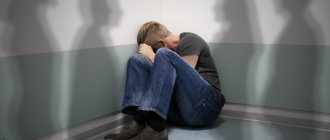Medical information is reliable Checked by Eremin Alexey Valentinovich
Acute psychotic disorder belongs to the group of transient psychoses. They are characterized by manifestations in the form of delusions, affective deviations, disorganization of thinking, hallucinations, mood disorders and other symptoms. It begins suddenly, there is no prodromal period. Recovery occurs after a few days or months. This pathological condition is most often observed in women, which distinguishes it from schizophrenia, in which the likelihood of its occurrence does not depend on gender.
Causes of acute psychotic disorder
The main reason for the development of acute psychotic disorder is severe psychotrauma, that is, a situation that is perceived by a person as severe stress:
- death of a loved one;
- divorce;
- job loss;
- car accident;
- stay in a war zone;
- physical or mental violence;
- long stay in a mentally aggressive environment;
- loss of money;
- economic difficulties.
Provoking factors contributing to the appearance of an acute psychotic reaction may be:
- hereditary predisposition;
- severe fatigue;
- lack of sleep;
- alcohol abuse;
- taking drugs.
Most often, acute psychotic disorder occurs in a certain type of person. Usually these are impressionable people who tend to take difficulties to heart, or people with a high level of fear and anxiety. In some cases, strong positive emotions can also cause the development of the disease.
Diagnostics and varieties
According to the international classification, acute psychotic disorder is diagnosed based on the following signs:
- sudden onset with hallucinations, delusions, incoherent speech;
- not meeting criteria for a depressive episode or mania;
- confusion not associated with organic disorders;
- exclusion of possible brain diseases, severe metabolic disorders;
- lack of connection between the attack and the use of a psychoactive substance;
- the presence of a connection between a stressful situation that occurred no earlier than two weeks before the development of clinical symptoms of acute psychosis.
Depending on the characteristics of the manifestation, the following types of acute psychotic disorder are distinguished:
- polymorphic with signs of schizophrenia;
- polymorphic without signs of schizophrenia;
- schizophrenia-like (with a schizophrenic reaction, acute form of schizophrenia, schizophrenomorphic);
- other types of delusional nature (including paranoid psychogenic deviations);
- other forms;
- unspecified disorder or reactive psychosis.
The symptoms of acute psychotic disorder are quite diverse, and often they can simulate other mental disorders - manic-depressive syndrome, schizoaffective disorders, depressive episode. But these diseases are preceded by a prodromal period and require long-term treatment. And in an acute process, symptoms increase quickly and are quickly relieved with the help of medications.
Management of patients after discharge
After discharge, the patient undergoes outpatient treatment, which includes observation, drug therapy and psychotherapy. Outpatient treatment is necessary to monitor the effectiveness of drug therapy during the period of gradual reduction in drug dosage.
Outpatient treatment continues for 1 year. The patient visits the attending physician once every 2–3 weeks. In the presence of concomitant mental disorders that have caused the onset of APPD, regular visits to a psychotherapist are a prerequisite for recovery.
Our psychotherapists and psychologists with extensive clinical experience provide sessions of individual, group and relaxation psychotherapy. Depending on the case, the doctor will select the method and the required number of sessions. As a rule, psychotherapy sessions are held at intervals of 2–3 weeks. At the patient's request, sessions can be held more frequently.
Acute polymorphic psychotic disorder
Acute polymorphic psychotic disorder without signs of schizophrenia most often manifests itself in the form of delusions, where the main theme is one’s own greatness, or guilt, the presence of a serious illness, or persecution. Hallucinations and delusions replace each other every day and hour.
There is also a constant change of affects, the mood can be elevated, and after a while it is replaced by severe depression. The symptoms of this disorder are very variable and changeable over time. Thinking and physical activity may slow down or speed up. Anxiety, confusion, and lack of attention are often observed. Distinctive features of polymorphic disorder are:
- constant change in the intensity of manifestation and nature of hallucinations, delusional ideas, mood;
- suddenness of symptoms;
- absence of criteria characteristic of other mental disorders.
Acute polymorphic mental disorder with symptoms of schizophrenia is considered a more severe form of the disorder, it can develop into schizophrenia, and is usually accompanied by the following symptoms:
- delirium of influence of external forces on the patient;
- confidence in your superpowers;
- conviction in reading his thoughts, imposing them from the outside;
- hallucinations with voices that evaluate his actions, talk to each other, laugh at him (Kandinsky-Clerambault syndrome);
- other psychotic manifestations and affective disorders.
These symptoms do not always indicate that a person has developed schizophrenia. If assistance is started in a timely manner, severe mental deviation can be avoided. Otherwise, the patient’s condition worsens, and a schizophrenic personality defect gradually forms. Thus, an acute disorder of this type is diagnosed based on the following signs:
- rapid development of the clinic and abrupt start;
- typical changes characteristic of schizophrenia that last less than a month;
- constantly alternating psychotic and affective disorders (anger, euphoria, anxiety).
Why does APPR develop?
Acute polymorphic psychotic disorder is a mental illness that is characterized by a large number of symptoms, ranging from behavioral disorder to delusions and hallucinations.
The disease belongs to acute psychosis, according to ICD-10 it is assigned code F23. Acute psychoses are characterized by a rapid and sudden onset of mental disorders. That is, they are pronounced and develop quickly, sometimes within a few days. In this case, the somatic nature of the disorder is excluded. Its duration with adequate treatment is short, ranging from several weeks to several months.
The main cause of the disorder is a strong psychotraumatic factor, a significant stressful situation. The disease can be triggered by some loss: a loved one, a job. Or, for example, a car accident, physical violence, major theft or loss.
Additional circumstances add fuel to the fire:
- heredity, if one of the relatives had a mental disorder;
- lack of sleep, overwork shortly before the main event;
- alcoholism, drug addiction.
A stress trigger does not have to be negative. Illness also causes positive emotions.
Here is an example of a situation that led to the appearance of this type of psychosis. The young man was intensively preparing to defend his thesis. I was very worried, didn’t get enough sleep for several nights in a row, and was mentally overtired. Having successfully passed the work, I relaxed. He went on a drinking binge and was in high spirits. Then characteristic symptoms appeared. And a couple of weeks later, his relatives took the guy to a psychiatric clinic, where he was diagnosed accordingly.
Schizophrenia-like acute psychotic disorder
Schizophrenomorphic acute disorder is accompanied by Kandinsky-Clerambault syndrome, delusions and hallucinations. Usually the patient experiences confusion or is in a state of passion. In the first case, a person does not understand who he is, where he is and at what time. The second option is accompanied by anger, severe fear, anxiety, and some experience a state of ecstasy and euphoria.
Acute schizophrenia-like psychotic disorder develops very quickly. In some cases, a person exhibits disorganization of speech; it is fragmented and devoid of meaning. Sometimes he experiences catatonia - freezing for a long time in one position, or motor agitation.
With this deviation, typical symptoms characteristic of schizophrenia are noted. But the main difference between this disorder and other acute psychoses is that affective and psychotic symptoms do not change, but are stable. Thus, during a schizophrenia-like attack there are a number of manifestations that make it possible to determine this deviation:
- rapid onset and development of the clinical picture of the disease;
- symptoms typical for schizophrenia;
- stability of affective and psychotic disorders.
Organization of treatment
Treatment for the condition in mild cases can be done at home. Hospitalization is required when desocializing disorders do not respond to outpatient treatment.
One conversation with a doctor is not enough to establish a diagnosis. At a minimum, the patient should be monitored around the clock for several days.
By delaying treatment, the likelihood of the condition worsening increases: the patient will experience suicidal attempts, severe depression, and the likelihood of transition to schizotypal disorder and schizophrenia.
Hospitalization involves several options for staying in a hospital:
- general regime – 24-hour stay in the hospital with movement around the department without restrictions;
- enhanced regime - round-the-clock surveillance with restriction of movement outside the boundaries of the department;
- strict regime - round-the-clock monitoring with constant support of medical staff.
There are more free regimes that allow the patient to stay outside the hospital:
- partial hospitalization - staying in the department part-time (day or night).
- medical leave - the absence of a patient from the department from several hours to several days. This decision is made by a special commission.
Regimes with partial stay “in the wild” make it possible to gradually adapt to society and help determine the effectiveness of treatment.
There is a possibility of forced hospitalization, without the permission of the court, when the patient’s behavior poses a danger to other people and to himself, as well as in cases where a person is unable to care for himself.
Other acute psychotic disorders
Another type of acute psychotic disorder is diagnosed when a person has delusions and hallucinations but does not have other signs of schizophrenia. Paranoid psychosis is a severe disorder and is accompanied by unsystematized delusional ideas. Most often, a person is convinced that he is being persecuted and wants to harm or kill him. Affective disorders include anxiety, fear, and severe agitation.
In the reactive form of acute psychotic disorder, a state of shock and complete loss of the patient in time and space are observed. The cause is severe psychological trauma. This type of psychosis can be of two varieties - hypokinetic and hyperkinetic type. In the first case, stupor prevails, complete numbness, accompanied by severe anxiety and fear. In the second, chaotic movements and strong excitement are observed.
Diagnosis F 23.2 Acute schizophreniform psychotic disorder
Acute psychotic disorder in which psychotic symptoms are relatively stable and consistent with a diagnosis of schizophrenia, but persist for up to one month. Polymorphic unstable traits described in subcategory F23.0 are absent. If schizophrenic symptoms are persistent, the diagnosis should be changed to schizophrenia (F20.-).
Acute (undifferentiated) schizophrenia
Brief schizophreniform:
- psychosis
- disorder
Oneirophrenia
Schizophrenic reaction
Excluded:
- organic delusional [schizophrenia-like] disorder (F06.2)
- schizophreniform disorder NOS (F20.8)
Acute psychotic disorder treatment in Moscow with drugs
The most favorable prognosis is considered to be polymorphic psychotic arousal, in which signs of schizophrenia are not observed. In some cases, it may go away on its own. But any form of acute psychosis requires hospitalization, since the symptoms of the disorders are very similar to other deviations, and long-term monitoring of the patient’s condition during treatment, at least a month, is necessary to establish the correct diagnosis. Dr. Isaev’s psychiatric clinic allows for round-the-clock monitoring and provides comfortable conditions for the patient’s stay in the hospital. If the symptoms only intensify while taking antipsychotics, then in this case schizophrenia or schizoaffective disorder is diagnosed.
Treatment of acute psychotic disorder in Moscow should be comprehensive. For this purpose, drug therapy and rehabilitation are used. A psychiatrist deals with this pathology. If the deviations are mild, assistance begins with the use of neurometabolites, usually prescribed:
- nootropics to restore brain cell function;
- B vitamins;
- amino acids.
A mild degree of dysfunction can be relieved with the help of these drugs in combination with psychotherapy. But most often it is necessary to resort to eliminating the symptoms of acute psychosis with the prescription of antipsychotics; they successfully help cope with delusional ideas and hallucinations of any type. After leaving the hospital, the person is transferred to long-acting medications. When choosing a product, the specialist is guided by the following principles:
- duration of the violation;
- features of manifestation;
- types of antipsychotics previously used;
- intolerance and resistance to drugs.
As additional therapy for acute psychotic disorders, depending on the characteristics of their manifestation, the following groups of drugs are used:
- mood stabilizers - improve mood;
- tranquilizers – calm and reduce anxiety;
- antidepressants - help treat depression and prevent suicide attempts;
- minor antipsychotics - used in elderly people and people with impaired renal and liver function, help normalize behavior.
Treatment of acute psychotic disorder in Moscow at Dr. Isaev’s clinic continues until positive dynamics appear. It is determined by the following criteria:
- absence of psychotic abnormalities;
- readiness to transfer to outpatient treatment;
- the patient’s understanding of his problem and the desire for a complete recovery;
- lack of resistance to treatment;
- the mental state assessment on the BPRS scale is no more than 35-40 points.
Without the use of competent therapy, many forms of acute psychosis develop into more severe mental disorders. In order not to undergo treatment for schizophrenia, schizoaffective and manic-depressive psychosis, you must strictly follow the recommendations of your doctor. Then the attack, as a rule, is observed as a one-time episode, and the person returns to normal life.
If there are no signs of schizophrenia
Polymorphic psychotic disorder without symptoms of schizophrenia is characterized by such features. If delusional ideas or hallucinations arise, they are weakly expressed and do not play a leading role. Their manifestations are less intense. Delusional ideas mainly have the nature of persecution, self-aggrandizement, assertion of guilt, or the presence of a fatal disease. Often patients see symbolism in everything in their environment.
Lability of mood and behavior comes to the fore: fear - joy, euphoria - anxiety. Changes in mental activity are possible, excitement gives way to apathy. There is a decrease in concentration, impulsivity and anxious behavior.
Changes in behavior, mood, and the nature of hallucinations occur very quickly.
Treatment of acute psychotic disorder: psychotherapy
In addition to medication methods, psychotherapy and social rehabilitation methods are used in treatment. Such assistance to the patient is structured according to the following scheme:
- determination of the patient’s personal problem;
- finding out his attitude towards his illness;
- finding the optimally effective method of therapy;
- planning work strategy;
- elimination of a person’s reaction to illness (feelings of guilt, shame, hopelessness, etc.);
- developing the right attitude towards the problem and treatment;
- training in self-identification of exacerbations;
- restoration of all possible personal resources, including skills, knowledge, interaction with other people, and the ability to solve problems.
Thanks to properly selected psychotherapy techniques, the patient will be able to:
- respond correctly to stress;
- learn productive ways to overcome it;
- develop communication skills;
- master methods of self-control;
- regulate your behavior within generally accepted limits;
- overcome difficulties without loss;
- stabilize emotional balance.
The difficulty of treating such patients is that many do not recognize their pathology, do not trust specialists, and do not want to establish contact. Often the reason for this behavior is a person’s fear of a psychiatrist. And this fact has an extremely negative impact on the course of the disease and prognosis. Therefore, at the first stage, every effort is made to achieve complete trust and interaction with the patient.
Many people do not understand why a patient needs rehabilitation if he was prescribed medications and his condition has stabilized. In fact, psychotherapy plays a huge role, since while a patient is in psychosis, his self-esteem is significantly reduced and social connections are disrupted, which affects his future life and can cause a second attack. To restore communications and normalize relationships in the family, individual work, group classes and family psychotherapy are used.
Groups bring together patients with similar problems. Some of them do not admit that they have a disease, but after classes they begin to see abnormalities in themselves. For example, one of the patients shares his delusional ideas, while others evaluate them as pathology. Such therapy also helps to establish connections with people, learn to communicate in microsociety, and respond to the behavior and statements of others. This allows you to successfully restore a person’s ability to communicate after leaving the clinic.
For complete recovery after an acute psychotic disorder, the following is also used:
- psychoeducation;
- auxiliary psychotherapy;
- communication trainings;
- art therapy;
- occupational therapy;
- cognitive behavioral therapy;
- Gestalt therapy;
- psychodynamic approach.
Hypnotic suggestion, bodywork practices, and holotropic breathing should not be used in people with psychotic disorders. These methods can significantly worsen a person’s condition and even transform psychosis into a severe form of schizophrenia.
Full recovery in a person with this disorder occurs within 3 months, in some cases it is possible to stop the condition in a few days. After this, the person must regularly visit the doctor for another year, or contact him if precursors of psychosis are detected.
When treating a polymorphic acute condition, you are provided with the following advantages:
- Our clinic, one of the few private clinics in Moscow , has its own superior hospital, which allows for effective treatment under the supervision of a wide range of specialists. In the wards for 1-3 people, optimal conditions have been created for a comfortable stay, including with relatives.
- The cost of hospital stay and treatment in general includes the availability of all necessary medications and procedures. The price of treatment is fixed in the contract and does not change during the process, that is, you do not incur any additional costs.
- We work with the most severe forms of acute and chronic psychosis , including particularly violent patients. You can call us in absolutely any situation.
- The clinic features doctors with a narrow specialization who will provide a competent approach to the therapy process.
- Depending on the severity and type of disease, we use different forms of treatment - a full-fledged inpatient clinic, night and day hospitals, home treatment with a visiting specialist.
- We provide intervention services - if necessary, a qualified doctor with experience in dealing with violent patients goes to the house and relieves an attack of aggression, gently convincing them of the need for hospitalization.
- We work with relatives of patients with psychosis , provide them with support and teach them the rules of behavior and help them develop the right attitude towards the problem. Classes are held in group form.
- Treatment is carried out 100% anonymously , without registration at a psychoneurological dispensary. We guarantee complete confidentiality.
- The clinic's specialists conduct scientific activities , participate in conferences, study and practice new methods of treating mental disorders.
Questions and answers
What should you do if a loved one has signs of a disorder, but does not want to undergo treatment?
You need to talk to him about this, try to understand and support him. The main thing is to identify how much the violation affects his work, personal relationships and life in society. If these parties suffer greatly as a result of the disease, then consultation with a psychiatrist and subsequent implementation of his recommendations are required.
Can the disorder be cured with medications alone?
Treatment must be prescribed by a doctor, and he takes into account many aspects and characteristics of each patient’s body. In some cases, for mild forms of disorders, only psychotherapy can be used. For moderate disorders, combined treatment with the use of medications. Severe types of illness require the use of drugs to normalize the condition, and psychotherapy acts as an additional method for the rehabilitation and resocialization of the patient.







